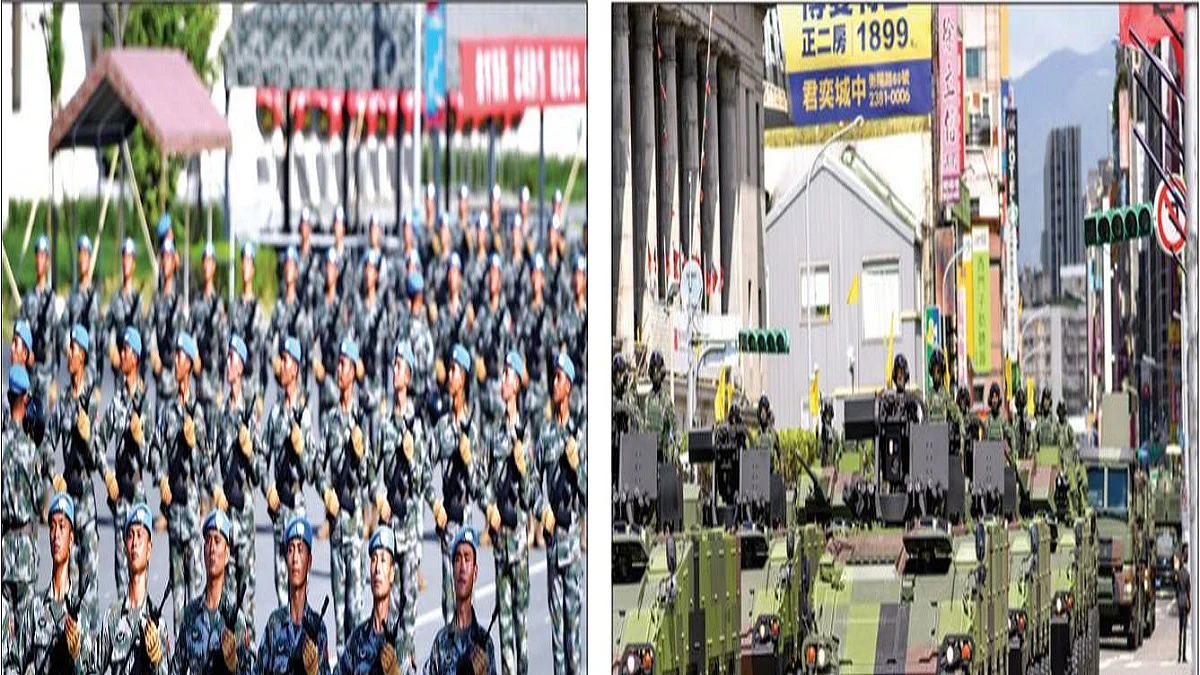US-China shadow boxing over Taiwan
A raging debate has been on in US over the desirability of US military intervention to stop China ‘annexing’ Taiwan. Ironically, only 15 countries officially recognise Taiwan and US is not one of them

China and Taiwan were divided during a civil war in the 1940s but Beijing insists the island will be reclaimed at some point, by force if necessary.
Taiwan, officially known as the Republic of China (ROC), is an island separated from China by the Taiwan Strait. The island nation has its own constitution, democratically elected leaders and about 300,000 active troops in its armed forces. Only 15 states maintain official diplomatic ties with Taiwan. No government has ever simultaneously maintained formal diplomatic ties with both China and Taiwan. The US has no official ties with Taiwan but does have a law which requires it to provide the island nation with the means to defend itself.
Beijing asserts that there is only “one China” and that Taiwan is part of it. Beijing claims that Taiwan is bound by an understanding known as the 1992 Consensus, which was reached between representatives of the Chinese Communist Party (CCP) and the Kuomintang (KMT) party that then ruled Taiwan. However, the two sides don’t agree on the content of this so-called consensus, and it was never intended to address the question of Taiwan’s legal status.
In a 2019 speech, Xi Jin Ping reiterated China’s long-standing proposal for Taiwan - that it be incorporated into the mainland under the formula of “one country, two systems.” This is the same formula used for Hong Kong, which guaranteed to preserve its political and economic systems and granted a “high degree of autonomy.”
Such a framework is not just deeply unpopular among the Taiwanese public. Pointing to Beijing’s recent crackdown on Hong Kong’s freedoms, Taiwan’s President Tsai Ing-wen and even the KMT have rejected the “one country, two systems” framework.
China has been employing a variety of coercive tactics short of armed conflict. Its objective is to wear down Taiwan and prompt the island nation’s people to conclude that their best option is reunification with the mainland.
Taiwan’s own military preparedness has withered, even as its people have become increasingly resistant to reunification with China. Surveys show that Taiwan’s 23 million people overwhelmingly favour their current de-facto independent state and strongly reject re-unification with China.
Taiwan has evolved into a vibrant democracy while China remains a deeply authoritarian, single-party Communist state. But China’s financial, political and military ascendancy has made preserving the island nation’s security a complex endeavour.
25 Chinese fighter jets, bombers and other warplanes flew in menacing formations off the southern end of Taiwan, a show of military might on China’s National Day, October 1. Last Monday, 56 Chinese warplanes tested Taiwan’s beleaguered air defences. Some analysts felt the flights were a warning to Taiwan’s president ahead of the island nation’s national day on Sunday, October 10.
China’s President Xi Jinping has said recently that “reunification” with Taiwan “must be fulfilled”, as heightened tensions over the island continue. Every Chinese leader since Mao has vowed to reunify Taiwan, but Xi is the first leader who commands a military strong enough to make a forced unification plausible.
And the military superiority US long held in Asia-Pacific region may not be enough to hold Chinese territorial ambitions in check. As such pressures intensify, the balance of power in the region is fundamentally shifting, pushing decades-long impasse over Taiwan’s future into a dangerous new phase.
In an interview with the BBC this week, US national security adviser Jake Sullivan said the US will “stand up and speak out” over any actions that may “undermine peace and stability” across the Taiwan Strait.
“The Taiwan issue has ceased to be a sort of narrow, boutique issue, and it’s become a central theater - if not the central drama - in U.S. - China strategic competition,” said Evan Medeiros, who served on President Obama’s National Security Council.
Any conflict over Taiwan has the potential to be a flash point in the U.S. - China relations. A top concern among U.S. analysts is that China’s growing military capabilities and assertiveness, as well as the deterioration in cross-strait relations, could spark a conflict. Such a conflict has the potential to lead to a U.S. - China confrontation.
However, few believe that a war is imminent, in part because of the staggering economic and diplomatic aftershocks at stake for both China and the United States.
(The writer is an IIM, Ahmedabad alumnus and former corporate professional. Views are personal)
Follow us on: Facebook, Twitter, Google News, Instagram
Join our official telegram channel (@nationalherald) and stay updated with the latest headlines